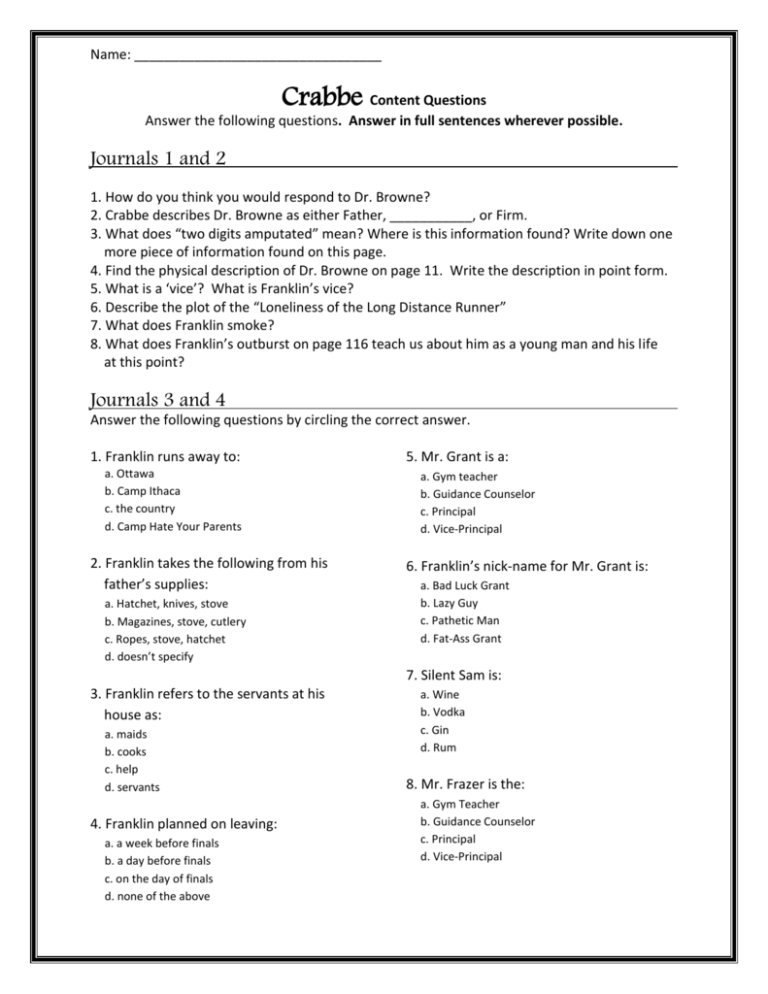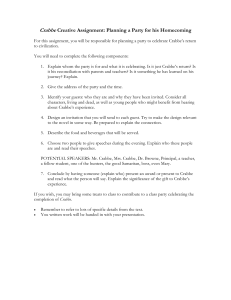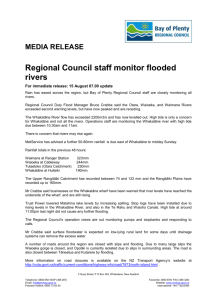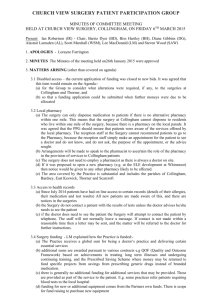Crabbe content questions
advertisement

Name: _________________________________ Crabbe Content Questions Answer the following questions. Answer in full sentences wherever possible. Journals 1 and 2 1. How do you think you would respond to Dr. Browne? 2. Crabbe describes Dr. Browne as either Father, ___________, or Firm. 3. What does “two digits amputated” mean? Where is this information found? Write down one more piece of information found on this page. 4. Find the physical description of Dr. Browne on page 11. Write the description in point form. 5. What is a ‘vice’? What is Franklin’s vice? 6. Describe the plot of the “Loneliness of the Long Distance Runner” 7. What does Franklin smoke? 8. What does Franklin’s outburst on page 116 teach us about him as a young man and his life at this point? Journals 3 and 4 Answer the following questions by circling the correct answer. 1. Franklin runs away to: a. Ottawa b. Camp Ithaca c. the country d. Camp Hate Your Parents 2. Franklin takes the following from his father’s supplies: a. Hatchet, knives, stove b. Magazines, stove, cutlery c. Ropes, stove, hatchet d. doesn’t specify 5. Mr. Grant is a: a. Gym teacher b. Guidance Counselor c. Principal d. Vice-Principal 6. Franklin’s nick-name for Mr. Grant is: a. Bad Luck Grant b. Lazy Guy c. Pathetic Man d. Fat-Ass Grant 7. Silent Sam is: 3. Franklin refers to the servants at his house as: a. maids b. cooks c. help d. servants 4. Franklin planned on leaving: a. a week before finals b. a day before finals c. on the day of finals d. none of the above a. Wine b. Vodka c. Gin d. Rum 8. Mr. Frazer is the: a. Gym Teacher b. Guidance Counselor c. Principal d. Vice-Principal 9. Franklin’s nick-name for Frazer is: a. Fat-Ass Frazer b. Deadwood c. Beet d. Radish 13. Franklin’s favourite teacher was his favourite because: a. he looked like a slob b. he was young c. he paid attention to what his students said d. he made the students think 10. Franklin’s father worked as an: a. accountant b. engineer c. civil attorney d. corporate attorney 11. Franklin describes the storyline of the following novel in his history class: a. Lord of the Flies b. Lord of the Rings c. Loneliness of the Long Distance Runner d. Crabbe 12. Franklin’s favourite teacher is: a. Mr. Grant b. Mr. Peters c. Mr. Frazer d. Miss Wase 14. Crabbe’s author is: a. William Bell b. Franklin Crabbe c. Megan Dylan d. Fitzhenry Whiteside 15. The novel’s narrator is: a. William Bell b. Franklin Crabbe c. Megan Dylan d. Fitzhenry Whiteside Journals 5 and 6 “I don’t want to talk about it anymore. The kid’s going to have to work this all out for himself. I’m sick of the whole issue. It goes on and on. Do you want the light on?” “No, I can find my way. That’s easy for you to say. Very easy. But you don’t have to watch him flush his life down the drain. Because that’s what he’ll do if we let him. He’s not going to university. You know that, don’t you?” “What do you mean I don’t have to watch him? I’m his father for Christ’s sake…” 1. How does the above conversation between Crabbe’s parents reveal how they feel about him?__________________________________________________________________________ ______________________________________________________________________________ ______________________________________________________________________________ 2. Describe at least three things that Crabbe manages to accomplish once he reaches the camp. ______________________________________________________________________________ ______________________________________________________________________________ ______________________________________________________________________________ Journals 7 and 8 Answer the following questions by circling the correct answer. 1. “One minute the stream was so shallow that I couldn’t paddle, even if I did know how…” The word did is italicized: a. to emphasize that Crabbe knows how to canoe b. to note that he cannot paddle very well c. to draw attention to the entire sentence d. to emphasize that he taught himself how to canoe 2. “Dammit!” This is an example of a/an: a. exclamation b. question c. statement d. command 3. “That took ages, because I had to be careful not to get the down too wet.” When the author uses the word ages, he intends the word to mean: a. an infinite amount of time b. a long period of time c. a short period of time d. an historic period of time 4. After sleeping for a long time, Crabbe’s meal was: a. smoked salmon and chocolate nightmares b. smoked herring and vanilla wafers c. smoked herring and chocolate dreams d. smoked gouda and chocolate chips 5. Crabbe was scared by: a. a big thunderstorm b. an animal attack c. the wind d. his canoe 6. Crabbe compares himself to: a. an English teacher b. a bear c. a Buddha d. a shark 7. Crabbe couldn’t use his matches because: a. they were gone b. he didn’t bring any c. they were broken d. they were wet True or False: 8. _____ Crabbe was having an easy time moving the canoe. 9. _____ Crabbe didn’t do any physical work when he was at home. 10. _____ Crabbe enjoyed sitting and looking at the scenery. 11. _____ Crabbe thought about going home when he ran into problems 12. _____ Crabbe’s tent was ripped and unusable. Short Answer: 13. What else do you think might happen to Crabbe on his journey? Would you continue on or go home? _________________________________________________________________ ______________________________________________________________________________ ______________________________________________________________________________ _____________________________________________________________________________ Journals 9 and 10 Inferring meaning – Read the following excerpts. Page numbers are included if you need further clarification. Once you have read the excerpt, answer the question. Note that you are being asked to read between the lines. 1. P. 61 I got up and headed for the tent and my down womb. God, I wanted to talk to my old buddy, Silent Sam: the shivers that chilled me were not from the cold. Continued.... a. What is his “down womb” and why is this an appropriate descriptive phrase? (hint: think warmth/rest) ______________________________________________________________ b. What is the cause of his shivers? (hint: think Silent Sam) ___________________________ ____________________________________________________________________________ 2. P. 59 But the thing about someone who is escaping is this: he’s more concerned about what he’s leaving than what he’s going to do. I was lost from the time I left Ithaca Camp. And what was worse, I didn’t know I was lost. a. What exactly was “it” that Crabbe was leaving? (hint: why did he hate his life?) _________________________________________________________________________ _________________________________________________________________________ b. What can you predict about his journey after reading this statement? (hint: last two sentences) ________________________________________________________________ ________________________________________________________________________ 3. P. 66 “Now, gimme your name and where you’re from…” “No, I don’t want to do that,” I said. “Why?” “Just because I don’t want you to know. I could make something up.” She smiled and said, “You too, eh? Well that’s okay. I just wanted to make sure your mind is working right.” a. What does the woman mean when she says “You too, eh?”? (hint: why is Crabbe nervous to share personal details?) ____________________________________________________ __________________________________________________________________________ 4. P. 68 I looked at the thick hair that spilled from beneath her hat and thought that truth is stranger than fiction. a. You must turn to this page and read the entire passage again to answer this question. Why is “truth stranger than fiction” from Crabbe’s point of view?____________________ ___________________________________________________________________________ ___________________________________________________________________________ Journals 11 and 12 Match the description in column B with the term in column A. 1. 2. 3. 4. 5. 6. 7. 8. 9. 10. COLUMN A _____ birches/poplars _____ hardwoods _____ sumacs _____ geese/ducks _____ Mary _____ Crabbe’s love for Mary _____ Mary’s love for Crabbe _____ Square dot on the map _____ Ithaca Camp _____ promontory COLUMN B a. hunt camp b. lonely leader c. bright yellow leaves d. friendly e. start of Crabbe’s journal f. flaming red and orange g. migrate h. a piece of high land jutting out into the water i. blood red j. romantic Content Questions 2. How does Crabbe describe Mary? (p.65) ___________________________________________ ______________________________________________________________________________ 3. Describe the campsite from Crabbe’s point of view. __________________________________ ______________________________________________________________________________ 4. After falling over the waterfall, what injuries does Crabbe suffer? (p.67) ______________________________________________________________________________ 5. What words does Mary use to refer to food (p.75), bread (p.75), and traps (p.77)? ______________________________________________________________________________ 6. What does Crabbe learn to do from Mary? (p.77) ______________________________________________________________________________ 7. What can you infer about Mary hiding her pack? What is her full name? (p.78) ______________________________________________________________________________ 8. After telling Mary his story, what is Franklin’s response? (p.79) ______________________________________________________________________________ 9. How long has Mary been in the wilderness? (p.80) ______________________________________________________________________________ 10. Before leaving Crabbe in the wilderness to find his way home, Mary taught Crabbe how to use what two outdoor tools? ______________________________________________________________________________ Crabbe Crossword, Journals 11 and 12 ACROSS 1 A young tree 6 The length of time Mary has been in the forest 7 Crabbe's parents' church 9 A type of fish 10 A diagram of roadways, lakes, and rivers 12 Bread 16 Vodka 17 Someone addicted to alcohol 18 The woman's full name 19 Mary's description of Crabbe 1 DOWN 2 Wilderness, lakes, trees, animals 3 Crabbe's emotion after his success 4 Furry animal with cotton tail 5 An instrument that helps you orient your way around a forest 8 Guts 11 An assembly 13 Food for the winter 14 Crabbe's first name 15 A piece of land almost completely surrounded by water 2 3 4 5 6 7 8 9 10 11 12 13 14 15 16 17 18 19 Journals 13, 14 and 15 Reproduce the yin/yang symbol. Explain the symbol’s accompanying philosophy. ________________________________________________________________________ ________________________________________________________________________ ________________________________________________________________________ Use the following word bank to complete question 2-8. WORD BANK – not all words must be used, words may be used twice respect China meals animal briar fifty university vegetable raining detox wilderness love 2. Mary gives Crabbe a pipe made in _____________ about _______ years ago. 3. This pipe was made from ______________ wood. 4. Crabbe believes Mary is ___________________ educated. 5. Crabbe uses the pipe to ________________ . 6. Crabbe learned how to ___________________himself while living in the wilderness. 7. Crabbe could do the following now: a) Find food: ______________, _______________, and fish b) Build shelters and make fires, even when ____________________ c) Cook ____________________ 8. Crabbe wanted Mary to _________________and ________________ him. Short Answer Questions 1. Explain why Mary’s respect is so important to Crabbe. Use two examples from the text. 2. When Crabbe says that he is in love with Mary, how does this statement show the reader that he is still somewhat young and immature, even though he has grown up and changed a lot at this point of the novel? Journal 16 INFORMATION PARAGRAPH: Create the notes for an information paragraph using the following paragraph. Isolate only the important points, only the facts. Use a highlighter to help you isolate the facts. There were four of them, dressed very outdoorsy, like those dummies in the sports section of a big department store. Except these were mean-looking beggars. None had shaved for a few days and each was juiced to the eyeballs - you could tell from the way they moved with careful clumsiness as they played cards at a deal table before the blazing fire. One of them, the only one not overweight – damn near fell into the fireplace when he got up to poke the logs. Occasionally one would slam his cards onto the table with a roar, sending poker chips dancing all over the table and onto the dirty hardwood floor. The others would explode in braying laughter or shout what were probably curses – I couldn’t quite tell. The portion of the room that I could see through that bathroom window was littered with beer and liquor bottles (I was too scared to be envious), boots, and a few cigarettes. NOTES:________________________________________________________________________ ______________________________________________________________________________ ______________________________________________________________________________ ______________________________________________________________________________ ______________________________________________________________________________ Now, from these notes, compose a topic sentence and narrow down four or five points in order to use in a SUMMARY PARAGRAPH. Write the complete paragraph in your notes. TOPIC SENTENCE: ____________________________________________________________ 3 POINTS: i.___________________________________________________ ii. __________________________________________________ iii. _________________________________________________ iv. __________________________________________________ v. __________________________________________________ Journals 17 and 18 Inferring meaning – Read the following excerpts. Page numbers are included if you need further clarification. Once you have read the excerpt, answer the question. Note that you are being asked to read between the lines. 1. P. 117 “There were lots of hand and footholds alright – on a sunny day it would be fun to climb. But with numb, cold fingers and feet like frozen clubs, with twenty-four hours of travel behind you and a body half-dead, it was tough.” a. Whose body was half dead? b. How are chapters 17-18 a turning point in the novel and in Crabbe’s personal growth? 2. P. 119 “I suppose I knew all along what had happened. After a while I stopped looking and calling…Mary was down there. She lay on her back, twisted and broken by her fall to the jagged rocks on the valley floor.” (pg 119) a. Exactly how and why did Mary die? b. If you were Crabbe, how would you have honoured Mary’s dead body? 3. P. 123 “My curiosity soared again. I had to see the packs’ contents. I didn’t feel I’d be betraying her. There was no need for secrecy now. And that, strangely, was what did it. As soon as I thought that thought, that the campsite could be discovered now and it didn’t matter- the tears came…When they say your heart breaks I know what they mean. Something had been torn away, leaving empty pain.’ a. Why does this thought allow Crabbe to begin the grieving process? 4. P. 124 “I never met anyone who made me feel necessary. Not important: necessary. I mattered to her.” a. Why is it important for human beings to feel as though they matter to someone? 5. Pp.127-128 “Waiting around for someone to change your life is a loser’s game. Who’s going to do it? Only you know what you want…You know what I think Crabbe? I think a person reaches maturity when he strikes the last name off the blame list.” a. Explain how this statement could be true for all people, teens and adults, using two examples from your own life. 6. P. 128 “A life without significance is not worth living.” (pg. 128) a) What makes your own life feel as though it is significant? b) What do you think is making Crabbe feel as though his life is significant? c) Describe the worst possible life a human being could lead, with reference to the above quotation. d) Describe the best possible life a human being could live, with reference to the above quotation. Journals 19 and 20 Please answer the following questions in complete sentences unless otherwise indicated. 1. The best definition of the word omen is: a) premonition b) emotion c) haunting d) sadness 2. Using your own ideas and evidence from the story, explain why the snow is an omen for Crabbe. 3. Write down three characteristics that belong to Crabbe in Journal 19. Use examples from the story to describe these characters. 4. How is the Crabbe in Journal 19 very different from the Crabbe who decided to run away? 5. Write down three things that Crabbe did to prepare for his journey. 6. “I got up at dawn as usual and hung the sleeping bags while I prepared a big breakfast with lots of strong tea and more food than usual. (The bags have to be hung so as to dry out the moisture that gathers in them during the night from your body heat and breathing. If you don’t do that, the bag will be cold the next night and never really warm up.) (pg 133) - How is the bold information helpful to our understanding that Crabbe has grown-up. 7. Crabbe didn’t notice two things: wind and body temperature. Why was this a horrible oversight? 8. What did Crabbe do when he realized that a blizzard was on the way? 9. Describe Crabbe’s little ‘house’, or shelter from the storm. 10. “The greatest compliment you can give to a teacher, Crabbe, is to say, I don’t need you anymore.” Do you agree with this statement? Explain using information from the story and your own ideas. 11. What does Crabbe decide to do at the end of chapter 19? TRUE OR FALSE If the statement is true, write TRUE beside the statement. If the statement is false, write FALSE beside the statement. ________ Crabbe spent two nights and 1 and ½ days in his homemade house during the blizzard. ________ Crabbe abandoned his canoe. ________ Crabbe reached the lake by nightfall. ________ The protagonist was wearing half of his clothing. The rest was in the pack. ________ The person in the above statement traveled in the day for the last leg of his trip. ________ Crabbe lost his mitts and couldn’t find them again. ________ Crabbe decided to set up another camp before the last leg of his trip. ________ Frostbite was beginning to claim Crabbe’s hands and feet. ________ Crabbe’s left hand was rotten with frostbite. ________ William Bell is the author of Crabbe. ________ Crabbe is italicized in the above statement because it is the title of the novel. ________ At the end of chapter 20, Crabbe is going into surgery. Journal 21 and Digression MATCHING Match the person to the description Column A 1. ____ Nurse Owens 2. ____ Crabbe 3. ____ Dr. Bruster 4. ____ Dr. Browne 5. ____ Mr. Three-Piece 6. ____ Jack Johnson Column B a. small, skinny, short red hair b. stranger who drove Crabbe to hospital c. Hospital Administrator d. missing two fingers e. uniform hangs on her like a rag f. Psychiatrist SHORT WRITING TASK 1. “He is a police officer. And an adult,” answered the official from behind the desk. “I may be old-fashioned, but I see no reason why your elders need follow the same rules as you.” - Do you agree with this statement? Explain using two examples. 2. What was Crabbe’s situation when he woke up in the hospital? 3. The policeman asked Crabbe why he would not share his name. Explain what happened next and why this is another pivotal (important) moment in Crabbe’s life. 4. Why did the people at the hospital think Crabbe was off-balance? Journal 21 and Digression 1. How does Nurse Owens perceive/see Crabbe? 2. How does Nurse Owens know that Crabbe doesn’t believe his parents are to blame for his problems? (hint: an action) 3. Nurse Owens tells Crabbe that he must behave like a MAN. With reference to this suggestion, complete the following chart. Five characteristics of a real man 5 ways a real man makes the world a better place 1. 2. 3. 4. 5. 6. 1. 1. 2. 2. 3. 3. 4. 4. 5. 5. FILL IN THE BLANKS Crabbe signs himself out of the hospital and … Crabbe says that his mother brought him into the world, but Mary_________________________________________________________________. Brighton was the foreman at a ____________________________________________. Crabbe got a job at the above place because ______________________________________________________________________________ _____________________________________________________________. Crabbe found his _________________________________ and got it working again. When his father removed the brass candelabra, Crabbe saw it as a good ___________.




